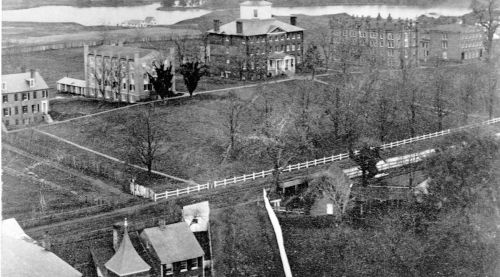
The St. John's College Digital Archives provides online access to special collections at the Greenfield Library (Annapolis) and Meem Library (Santa Fe).
Meem Library exists to support the academic program and life of St. John’s College. The library’s collection of 65,000 volumes is especially rich in classics of mathematics, science, literature, philosophy, theology, history, politics, and music, as well as in other books, print journals, CDs, DVDs, and digital resources supporting the academic and extracurricular interests of those in the St. John’s College community. In addition to housing these books and resources, the library is also the repository for the Santa Fe campus’s Archives, as well at the site for all Senior Essay and Master’s Essay Oral Examinations, which are held publicly in the formal Ault-Evers Room.
The library is open as a quiet campus study space for St. John’s students, faculty, staff, and alumni seven days a week during the college’s fall and spring academic semesters, with abbreviated hours during the summer academic semester and intersessions. Due to ongoing campus renovations, the library is currently closed to members of the general public.

The St. John's College Digital Archives provides online access to special collections at the Greenfield Library (Annapolis) and Meem Library (Santa Fe).